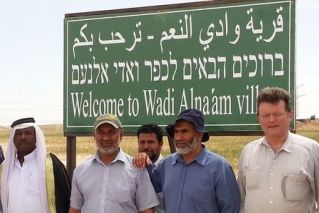 צילום: הוועד המקומי ואדי אל-נעם
צילום: הוועד המקומי ואדי אל-נעם
Prawer-esque discrimination continues in the Negev in a regional plan to forcibly move residents of rural Wadi al-Na’am to the town of Segev Shalom
The Association for Civil Rights in Israel (ACRI), Bimkom – Planners for Planning Rights, and residents the unrecognized Bedouin village Wadi al-Na’am filed a petition with the High Court of Justice this morning against a regional plan to enlarge the township of Segev Shalom, the primary purpose of which is the forcible transfer of Wadi al-Na’am’s 10,000 residents.
Wadi al-Na’am, located within the Ramat Hovav region, was established in the 1950s when Bedouin residents of the Negev were moved there under martial law. Since then – for some sixty years – the community has been deemed “temporary.” It has not been connected to water, electricity, sewage, telephone or roads, and residents suffer from a severe lack of education, health and welfare services.
Moreover, over the past decades, several of Israel’s most hazardous facilities have been established in Wadi al-Na’am’s immediate vicinity. The Ramat Hovav Industrial Area, whose land, air and water pollution puts nearby residents at substantial risk of exposure to dangerous materials, is just a few hundred meters from the village. Scores of high voltage electrical lines pass though the village. And east of the village, the military industrial area of Ramat Beka, is now used for, among other things, burying all explosive materials in Israel.
In the petition the residents argue that, not only are the state agencies promoting a plan that would strip them of their way of life, but furthermore, instead of removing the polluting activity from the region, the planning agencies are proposing relocation to an area that is still dangerously close to the hazards. A plan identical to the one currently being promoted was rejected in 2004 by the planning authorities after the Minisatry of Health declared that the proposed location of resettlement on the outskirts of Segev Shalom would endanger the health of the residents.
Government authorities have been negotiating with the residents about an alternate site for the village for over thirty years. The petition alleges that state is acting in bad faith by knowingly imposing the solution that the residents most vehemently oppose – forced urbanization into crowded neighborhoods in the town of Segev Shalom.
Planning authorities’ claims of adhering to a general policy of not establishing new communities in the Negev are belied by actual developments. At least fifteen new Jewish communities are being promoted in the Negev. The petitioners argue that this constitutes systematic discrimination in the urban planning policies in the Negev.
Attorney Gil Gan Mor of ACRI: “The state established the polluting factories next to the village of Wadi al-Naa’m, ignoring the existence of the community there, and now, when forced to find an alternative location, it seeks to impose a solution that contradicts the village residents’ way of life.”
Planner Nili Baruch of Bimkom: “The residents of Wadi al-Na’am have pursued a housing solution for years that will allow them to continue their communal life and agricultural practices. Just as the Jewish population is given the option of living not just in cities but also in rural villages, communities and kibbutzim, so too should the residents of Wadi al-Na’am be allowed to maintain a rural lifestyle.
Labad Abu-Afash, chairman of the village’s local committee: “For many long years we have negotiated with the authorities. Again and again we said, we are flexible and willing to negotiate on everything, other than Segev Shalom. We seek to form a farming community that will suit our lives as Bedouins.”
Additional Materials
The full petition (in Hebrew).
Video – A Just and Practical Solution for the Unrecognized Bedouin Villages in the Negev
More information on ACRI’s activities to defend the rights of Negev Bedouin







